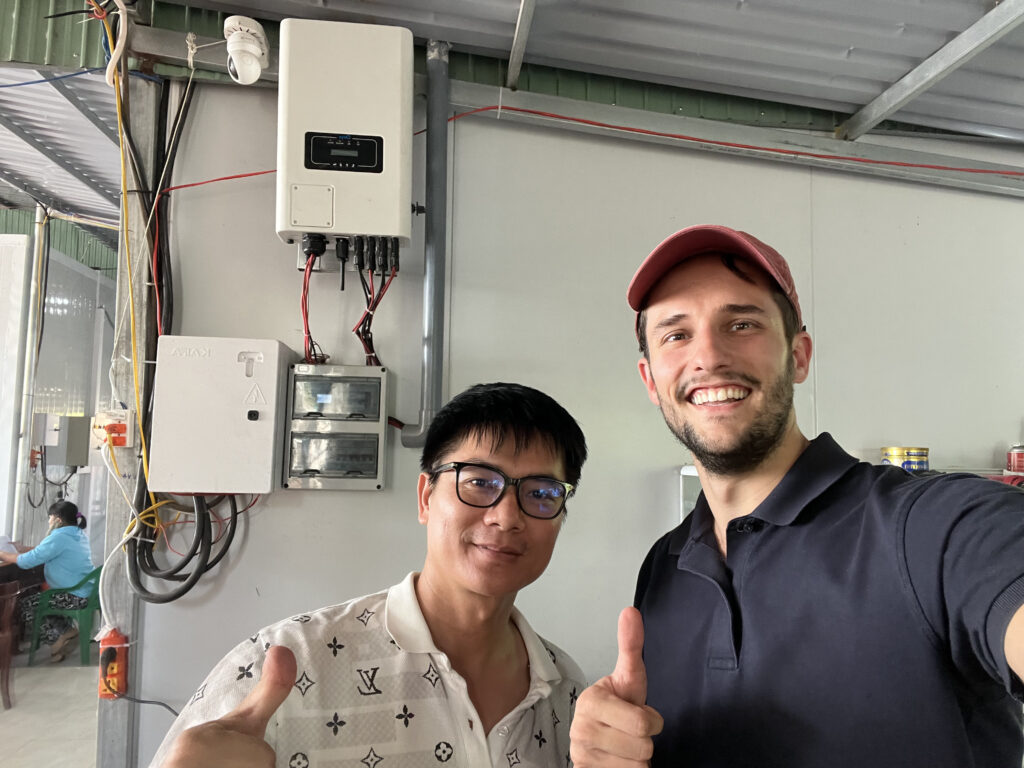By Kevin Junker, CEO, SmartSolar Vietnam –
When you think about Vietnam’s clean energy transition, large solar farms in the central highlands or mega-corporate sustainability commitments often come to mind. But the true test of transformation lies not only in scale – but in reach. That’s where SmartSolar Vietnam steps in: bringing solar to the rooftops of local gyms, car repair shops, and fruit vendors.
My entry into this space wasn’t from tech or finance – but through coal. While advising the provincial government in Quang Ninh, I visited coal mines and saw up close how dependent Vietnam’s energy system remains on fossil fuels. Over half of the country’s electricity still comes from coal – a statistic that stayed with me long after I left those sites. Around the same time, a friend working in climate tech in Norway sparked another thought:
Why is no one doing this in Vietnam – a country with more sunlight and just as much need for solutions?
That question grew into SmartSolar Vietnam – a small but determined attempt to make clean energy practical and possible for the many, not just the few.
Why a Just Transition Matters
Vietnam’s net-zero commitment by 2050, announced at COP26, was a bold and necessary signal. But turning that promise into reality? That’s the real challenge. It won’t be solved by utility-scale projects alone – it requires bringing small businesses, households, and communities along with us.
This is what a just transition means: not just clean energy, but equitable energy. If the move to a low-carbon economy only serves large corporates while excluding SMEs – the very backbone of Vietnam’s economy – then we’re not transitioning, we’re just shifting the imbalance.
Yet these same SMEs are often excluded from clean energy offerings – not because they’re unwilling, but because the system isn’t designed for them.
Reframing Access
At SmartSolar, we wanted to remove the barriers that stop SMEs from engaging with solar energy. Our subscription model means no upfront cost, no lock-in contracts. If customers move, we move with them. And our tailored credit models make room for businesses without perfect paperwork.
But this isn’t just about affordability – it’s about trust.

Kevin Junker, CEO, SmartSolar Vietnam thumbs up on building collective impact.
“It’s Too Good to Be True!”
We hear it all the time: “It’s too good to be true! No costs upfront? What’s the catch?” And honestly, I don’t blame them. It’s not the kind of offer most small businesses expect – especially in a space that’s often complex and expensive.
That’s why we spend time explaining how it actually works. Our investors finance the installation because they believe in Vietnam’s clean energy future. We earn gradually over time, and the customer starts saving from day one.
Once they see it on their electricity bill – and nothing’s broken, nothing hidden – that skepticism often turns into trust. Some of our biggest supporters now are former skeptics.
Small Actions, Collective Impact
A typical 50kWp solar system saves around 40 tonnes of CO₂ per year – equivalent to planting over 1,800 trees or taking 8–10 cars off the road. Financially, it can save an SME around USD 2,000 annually – savings that often go straight back into operations, hiring, or stability.
It may not sound like much on its own. But multiply it across thousands of SMEs in Vietnam, and the collective impact is real – both economically and environmentally.
Grounded Progress
Growth has been steady – and deeply personal. Many of our customers begin with caution, unsure of how solar might fit into their daily operations. But when they see it working, see the numbers reflected in their bills, they tell others. That kind of momentum may not make headlines, but it builds something more enduring: trust and long-term adoption rooted in lived experience.
We’re also piloting new ways to integrate energy more seamlessly into daily life – like adjusting air conditioning dynamically based on solar availability, or installing EV chargers at customer sites. For us, solar isn’t the end point – it’s an entry into a smarter, more responsive energy system built around people’s real needs.
Looking Ahead
At the Vietnam ESG Investor Conference 2025, where I recently spoke, there was clear recognition that ESG frameworks and commitments are evolving – and in some markets, even unravelling or stalling – while climate change itself is accelerating. The pace of environmental impact is outstripping the pace of action.
That’s why it’s more important than ever to enable practical climate solutions – not just for corporates or global supply chains, but for the SMEs, households, and informal businesses at the heart of Vietnam’s economy. The transition needs to be accessible and actionable – not overwhelming.
At SmartSolar, we see firsthand that the energy transition is not only a technical challenge – it’s a social one. If small businesses are left out because solutions are too expensive, too complicated, or too disconnected from their realities, we risk leaving behind the very communities driving Vietnam’s growth.
As conversations on ESG and Net Zero continue at the national and regional level, we’ll keep focusing on what happens at ground level – supporting everyday businesses to take part in the transition in ways that are accessible, sustainable, and relevant to their lives.
Because meaningful climate action isn’t measured in announcements – it’s measured in who gets to participate.
This blog was created with the support of AI technology. All views and opinions expressed on this site are those of the individual authors and comments on this site are the sole responsibility of the individual contributor.

